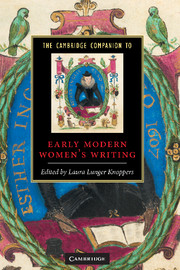Book contents
16 - Prophecy and religious polemic
from Part III - Genres and modes
Published online by Cambridge University Press: 28 July 2010
Summary
'The time is coming', wrote Mary Cary in 1651, when 'not onely men, but women shall prophesie; not onely aged men, but young men; not onely superiours but inferiours; not only those that have University-learning, but those that have it not; even servants and handmaids.' Cary is prophesying about prophecy itself, her words' sense of urgency suggesting the peculiar pertinence of this discourse to the turbulent mid seventeenth century. Prophecy was a mode of utterance that both testified and contributed to the revolutionary changes of those years. Cary invokes it as a form of address which would sweep away all the usual social strictures regarding who was authorized to speak on matters of public importance: all would prophesy, including those habitually excluded from authoritative public discourse - women, young men, inferiors, the uneducated, 'even servants and handmaids'. Cary was a Fifth Monarchist, and so part of a millenarian group actively preparing for the imminent return of King Jesus, but her radical religious politics alone do not account for her enthusiastic anticipation of the revival of prophecy. John Milton had likewise declared that 'now the time seems come, wherein . . . all the Lords people are become Prophets'. Milton, close to the heart of revolutionary power, and Cary, a more marginal figure, both understood prophecy to be a timely and vital force in the service of God.
- Type
- Chapter
- Information
- The Cambridge Companion to Early Modern Women's Writing , pp. 235 - 246Publisher: Cambridge University PressPrint publication year: 2009
- 2
- Cited by

